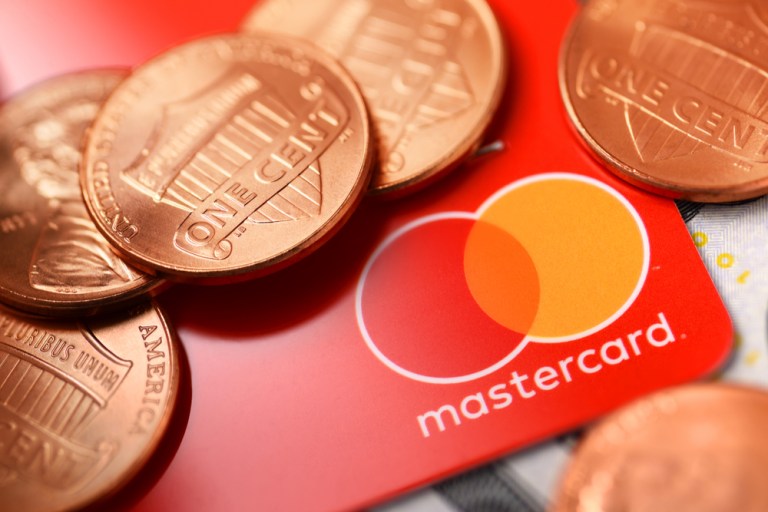
Absent the same impact U.S. tax laws had on other firms recently reporting results, Mastercard put up numbers Thursday (Feb. 1) that topped expectations. Those figures came on the heels of increased spending by the firm’s cardholders both in the U.S. and abroad, the company reported during a conference call with analysts.
Fourth quarter sales were up 20 percent from last year to $3.3 billion, while consensus stood at $3.26 billion. Excluding the aforementioned tax impact, earnings per share came in at $1.14, two pennies better than Wall Street expectations.
Cross-border volume was up double digits as cardholders spent money beyond the borders of their home territories, and Mastercard said fees tied to those transactions were up 17 percent from last year. In addition, the number of switched transactions was up 17 percent to 16.7 billion, and gross dollar volume grew 13 percent.
The company also counted 2.4 billion Mastercard and Maestro-branded cards issued globally as of year-end.
According to Mastercard CEO Ajay Banga, tax reform might be a benefit for spending, as businesses may invest more and consumers will have more disposable income. As for its own tax savings, the company will use at least part of the money to boost financial inclusion.
Looking ahead, Mastercard’s net revenue growth will be in the higher end of low double digits.
Unemployment remains low in the U.S., Banga said, and consumer confidence remains healthy. Holiday sales were solid, though year-over-year growth in the latest quarter was a bit slower than that seen in 2017.
In Europe, Germany and France are helping to drive some mild growth, while a slowing environment in the U.K. reflects continued concern and impact tied to Brexit over the medium and long terms. In Latin America, he continued, “We are cautiously optimistic that economic growth in that region in 2018 will be similar to 2017.”
As for Vocalink, Banga focused on the company’s image-based clearing system, which launched corporate fraud alert products with Royal Bank of Scotland (RBS) as the first customer.
Issuers have been expanded to 1,200 issuers in 46 markets, up from 21 markets to begin the year. Tokenized transaction growth is up 500 percent, and Masterpass saw increased adoption in the grocery category, Banga added.
Turning to where tax savings might be spent, the executive stated Mastercard “will absolutely accelerate investments — both in an organic and inorganic basis — in areas that are aligned with our business strategy, digital infrastructure of fast ACH [and] data analytics.”
CFO Martina Hund-Mejean noted that worldwide gross dollar volume was up 13 percent, with double-digit growth in all regions outside the U.S. Without the U.S., volume growth was up 15 percent, a 2 percent increase from last year’s quarter, and that growth was spearheaded by Europe and Asia.
Rebates and incentives saw a 23 percent increase, Hund-Mejean noted, with a reflection of higher volumes. She also commented on cryptocurrencies.
“With the recent interest in and the price volatility of cryptocurrencies, we have seen an increase in this activity,” Hund-Mejean noted. “Just to be clear, we do not switch or settled cryptocurrency transactions over our network. Our plans do not assume this type of activity will continue, as we have no line of sight as to how cardholders will view cryptocurrencies in the future, and given that we’ve already seen some declines in our recent weekly trends.”
During the question and answer session with analysts, Hund-Mejean stated the firm is seeing an uptake in Maestro-branded cards being converted into standard Mastercard debit cards in Europe and other geographies. Speaking generally about overall volumes, cross-border volumes are up 22 percent so far in 2018, and volume outside of the U.S. appears to be “picking up.”
One international item of note: Amid weakening economic and political conditions, Hund-Mejean said Mastercard is excluding operations tied to Venezuela from its financial results going forward.
According to Banga, Europe is seeing “large growth across the region on merchant acceptance…that used to prefer to take either local payment systems only, or cash and goods.” In terms of the recently enacted PSD2, some of the tax savings will be funneled toward “focusing on the opportunity with fast ACH” and on Vocalink efforts in the region.
The lines of questioning turned toward eBay and the impending end of its relationship with PayPal.
“I’m pretty certain that all of you thought about one day that relationship will come up for reassessment, and it’s come up for reassessment and eBay has chosen what it wants to do…” Banga said. “I think we are a key beneficiary of that because as you know, we’ve got a great partnership with PayPal, which includes all their co-branded cards and their corporate cards and all the understanding and how their wallet is used, including visibility of the brand and the non-steering towards ACH and the data flow.”
In terms of general strategies surrounding digital payments, the executive had further comments.
“You’ll find us doing all kinds of things with banks, with merchants…” Banga noted. “We’re going to keep investing and aligning the developer community to access our capabilities at digital,” eyeing the “simplest form of [application program interfaces (APIs)] and [software development kits (SDKs)] so we can get embedded in more and more locations… PayPal, eBay [and] other issues will come and go, [and] we are doing what we need to do.”